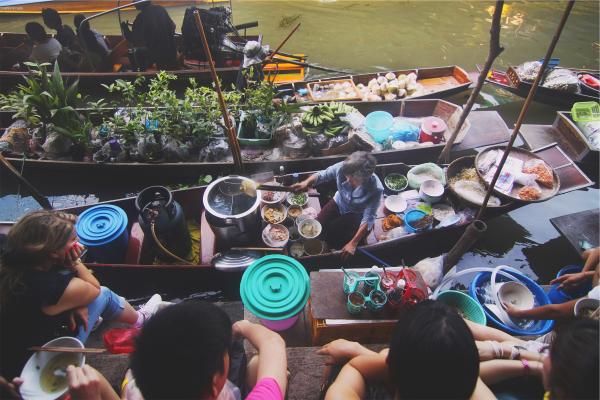I landed in Beijing at the start of a round-the-world trip. It was overwhelming and spectacular all at once—but with two years until I’d return home again, I had to be careful not to blow my budget.
Here’s how I spent two weeks exploring bustling Beijing, all for under $30 per day.
Navigating Food
1. Bring a re-usable water bottle with you. Ideally find one that has a built-in tea filter, and stock up on tea or instant coffee. Potable hot water for tea or coffee is readily available, even on long-distance trains. (It’s usually found near the bathrooms.) If you’re desperate for real coffee, you can find cheap stuff for 6 CNY ($1.15) or Starbucks for 15 CNY ($3), but considering lunch only costs 15 CNY, you’re better off bringing your own drink.
2. If you happen to be in a tourist area and your stomach grumbles, make sure to distance yourself from the main attraction. By walking five minutes in any direction, you’ll find cheap, authentic restaurants. Stick to this five-minute rule and you’ll have a good chance of finding an English menu—any further and you may be out of luck.
3. Sometimes it’s important for your sanity to have a cheat meal at a chain fast food restaurant. Travelling on a budget often means that you’re going to be eating foods that are high in carbs, such as street pancakes or beef noodle soup (the latter being mostly noodles). It can be refreshing to walk into a restaurant and know exactly what you’re going to get. Try to spice it up with a local twist on the combo, like getting corn kernels instead of fries.
4. Grocery stores and markets are on every corner. Stock up on local fruits and nuts to carry with you as snacks. Not only will they round out your diet, they’ll also help ward off hunger in a museum where food is triple the price.
5. Try to eat at a restaurant without an English or “picture” menu at least once. The best meal that I had was when we wandered into a restaurant and couldn’t communicate with the waitress. Instead of playing charades, she decided to bring us out a giant bowl of shellfish soup to share. It was definitely too large to finish, but it was fun to put our trust in a stranger and try an entirely new dish.
Navigating the City
6. For transit discounts, purchase a rechargeable metro pass (referred to as "Yikatong" or an IC card), particularly if you’re taking longer bus trips. Most buses charge a basic price in cash and a discounted price if you use the IC card, which can be purchased for 20 CNY ($4) deposit. Before you head out to purchase your pass, ask a staff member at your hostel to write down the information in Mandarin to hand to the metro employees.
Beijing has public toilets everywhere, but there will never be toilet paper—not in museums, not in temples, not in restaurants.
7. If you’re using public transit—which you should—make sure to take breaks from it. The system will wear you down; it is exhausting being constantly crowded, stared at and lost. You may even consider extending your stay by a few days to allow time to rejuvenate between site-seeing days.
8. Don’t try to “wing it” on a bus. Instead, write down your destination in Mandarin. No one will understand your pronunciation of Zhai Tang, but if it written in Mandarin someone will be able to help you. Often, the bus stop names will only be written in Mandarin, so you can compare the text to help find your way.
9. Wear comfortable shoes. There are stairs everywhere. Some of the metro transfers require a five-minute walk— a large part of which involves stairs—and many of the temples are built on hills. (If you’re worried about standing out as a tourist because of your shoes, I have news for you; you stand out anyway.)
10. Don’t buy a group tour package to the Great Wall—you can do it cheaper on your own. Tour packages cost around 180 CNY, whereas doing the trip on your own will cost 50-100 CNY, depending on which section of the wall you choose to visit.
Navigating the Culture
11. Bring your own toilet paper. Public toilets aren't hard to come by in Beijing, but there will never be paper—not in museums, not in temples, not in restaurants. Keep some in your purse. Keep extra for your travel buddies who haven’t read these tips.
12. Make sure to bring cash, as the backpacker version of Beijing is dominated by cash transactions. Mobile payment methods (such as WeChatPay) do exist and you might be able to pay for your hostel with a credit card, but there is often a surcharge. Your cheap street meals and any taxis will be dealt with in cash and there isn’t always an ATM nearby.
13. There is limited Internet access in China, which means that sites like Facebook and blogging platforms may be blocked. You can get around this by downloading a virtual private network (VPN) before landing in the country. Alternately, embrace it as an enforced digital detox.
14. Don’t make too much fun of the poor translations. It might be broken English, but just imagine if everything was in Mandarin. You would be so much worse off. Appreciate the Roman alphabet.
15. Talk to strangers. I invited my hostel roommates out to dinner and discovered that one had studied Chinese arts and culture, while the other one had studied Mandarin and tai chi. I basically had my own personal translator and guidebook.
Most importantly, learn to embrace the differences between Beijing and your home. There will be things that surprise you, bewilder you and gross you out—but there will be more things that fascinate you, mesmerize you and impact you forever.
Add this article to your reading list




